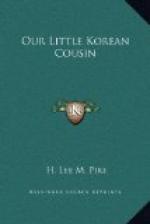THE MONK’S STORY
One evening, after Yung Pak had finished his supper, he sat talking with his father and Wang Ken.
The early evening hour was often spent in this way. It was a time of day when Ki Pak was generally free from any official duty, and he was glad to devote a little time to his son. He would inquire about the boy’s studies as well as about his sports, and Yung Pak would regale his father with many an amusing incident or tell him something he had learned during study hours. Sometimes he would tell of the sights he had seen on the streets of Seoul, while on other occasions he would give account of games with his playmates or of his success in shooting with a bow and arrow.
This latter sport was very common with the men and boys of Korea. It was approved by the king for the national defence in time of war, and often rewards were offered by rich men for winners in contests. Most Korean gentlemen had private archery grounds and targets in the gardens near their houses.
Ki Pak had an arrow-walk and target in his garden, and here it was that Yung Pak used to practise almost daily. He often, too, invited other boys to enjoy the sport with him.
At regular times every year public contests in arrow-shooting were held, and costly prizes were offered to the winners by the king. The prizes were highly valued by those who secured them, and Yung Pak looked forward with eager anticipation to the day when he should be old enough and skilful enough to take part in these contests.
While Yung Pak was listening to the conversation between his father and tutor on this evening, a knock was heard.
On opening the door there was seen standing at the entrance a man rather poorly clad in the white garments worn by nearly all the people of Korea. But upon his head, instead of the ordinary cone-shaped hat worn by the men of the country, was a very peculiar structure. It was made of straw and was about four feet in circumference. Its rim nearly concealed the man’s face, which was further hidden by a piece of coarse white linen cloth stretched upon two sticks and made fast just below the eyes.
This method of concealing the face, together with the wearing of the immense hat, was a symbol of mourning. Such a sight was not uncommon in the streets of Seoul, and Yung Pak knew well its meaning.
With great courtesy and hospitality Ki Pak invited the stranger within the house.
“I thank you for your kindness,” said the visitor. “I am a stranger in your city, a monk from a monastery in Kong-chiu. Your peculiar law not allowing men upon the street after nightfall compels me to seek shelter.”
“To that you are entirely welcome, my friend,” said Ki Pak, whose hospitable nature would have granted the monk’s request, even if sympathy for sorrow and reverence for religion had not also been motives for his action.
“Let me get the man something to eat,” said Yung Pak as the monk seated himself upon a mat.




